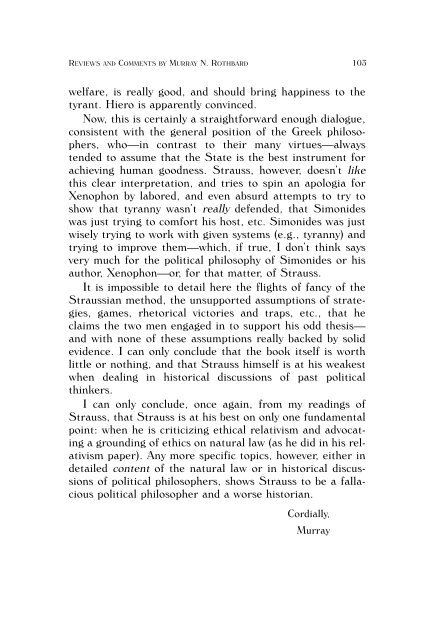Murray N. Rothbard vs. the Philosophers - Ludwig von Mises Institute
Murray N. Rothbard vs. the Philosophers - Ludwig von Mises Institute
Murray N. Rothbard vs. the Philosophers - Ludwig von Mises Institute
Create successful ePaper yourself
Turn your PDF publications into a flip-book with our unique Google optimized e-Paper software.
REVIEWS AND COMMENTS BY MURRAY N. ROTHBARD 103<br />
welfare, is really good, and should bring happiness to <strong>the</strong><br />
tyrant. Hiero is apparently convinced.<br />
Now, this is certainly a straightforward enough dialogue,<br />
consistent with <strong>the</strong> general position of <strong>the</strong> Greek philosophers,<br />
who—in contrast to <strong>the</strong>ir many virtues—always<br />
tended to assume that <strong>the</strong> State is <strong>the</strong> best instrument for<br />
achieving human goodness. Strauss, however, doesn’t like<br />
this clear interpretation, and tries to spin an apologia for<br />
Xenophon by labored, and even absurd attempts to try to<br />
show that tyranny wasn’t really defended, that Simonides<br />
was just trying to comfort his host, etc. Simonides was just<br />
wisely trying to work with given systems (e.g., tyranny) and<br />
trying to improve <strong>the</strong>m—which, if true, I don’t think says<br />
very much for <strong>the</strong> political philosophy of Simonides or his<br />
author, Xenophon—or, for that matter, of Strauss.<br />
It is impossible to detail here <strong>the</strong> flights of fancy of <strong>the</strong><br />
Straussian method, <strong>the</strong> unsupported assumptions of strategies,<br />
games, rhetorical victories and traps, etc., that he<br />
claims <strong>the</strong> two men engaged in to support his odd <strong>the</strong>sis—<br />
and with none of <strong>the</strong>se assumptions really backed by solid<br />
evidence. I can only conclude that <strong>the</strong> book itself is worth<br />
little or nothing, and that Strauss himself is at his weakest<br />
when dealing in historical discussions of past political<br />
thinkers.<br />
I can only conclude, once again, from my readings of<br />
Strauss, that Strauss is at his best on only one fundamental<br />
point: when he is criticizing ethical relativism and advocating<br />
a grounding of ethics on natural law (as he did in his relativism<br />
paper). Any more specific topics, however, ei<strong>the</strong>r in<br />
detailed content of <strong>the</strong> natural law or in historical discussions<br />
of political philosophers, shows Strauss to be a fallacious<br />
political philosopher and a worse historian.<br />
Cordially,<br />
<strong>Murray</strong>


